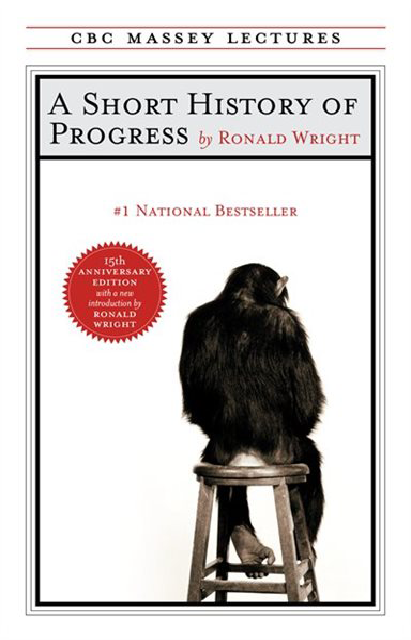A Short History of Progress

Now released in a new Fifteenth Anniversary Edition with an update by the author, Ronald Wright’s prescient analysis of the “progress trap” (a term he coined) has only become more relevant. The past two centuries were a time of runaway growth in human population, consumption, and technology, placing a colossal load on all natural systems, especially earth, air, and water—the very elements of life. The most urgent questions for the twenty-first century are: Where will this growth lead? And what kind of world is our present bequeathing to our future?
Each time history repeats itself, so it’s said, the price goes up. In A Short History of Progress —his acclaimed 2004 Massey Lectures, an international bestseller in many languages —Ronald Wright argues that our modern predicament is as old as civilization, a 10,000-year experiment we unleashed but have seldom controlled. Only by understanding patterns of triumph and disaster which humanity has repeated since the Stone Age can we understand the experiment’s inherent dangers and, with luck and wisdom, shape its outcome. In his new introduction to this Anniversary Edition Wright outlines our latest developments and asks whether we can still get the future right.
Honours
Libris Nonfiction Book of the Year Award, 2005
Book of the Year: Independent
Book of the Year: Globe and Mail
British Columbia Award for Canadian Non-Fiction finalist
Chosen one of the 25 most influential books of the last 25 years by the Literary Review of Canada in 2019
Reviews
“A brilliant analysis of everything humanity has done to ruin itself down the ages.”
Jan Morris, Books of the Year, Independent on Sunday
“A compelling work of distilled wisdom… Wright is a pungent phrase-maker and a penetrating thinker. His learning is historical, anthropological and cross-cultural.”
Alex Danchev, Times Literary Supplement
“Wise, timely, and brilliant…. I don’t care if you have never read and will never read any kind of book at all, but you must read this one. [Wright] achieves in a mere 132 pages what another author couldn’t manage in 1,300.”
Paul Williams Roberts, Globe and Mail
“Provocative… Already a bestseller in Canada, Wright is now making his biggest mark since his debut novel (A Scientific Romance, 1997) attracted wide attention… illuminating and disturbing, and expansively documented.”
Kirkus Reviews (starred review)
“In this short, superb essay, Wright succeeds at impressing on his readers how fragile the remarkable experiment we call civilisation really is.”
Johann Hari, The Liberal
“The perfect Massey Lecture…at once urgent and timeless.” Charles Foran, Literary Review of Canada
“Wright sifts the findings of archaeology and anthropology with thoughtful grace to build a potent argument.”
Steven Poole, Guardian
“Impressive…for the evidence Wright assembles from his authoritative grasp of history, and for the skill and clarity with which he imparts information. He makes history, ecology, anthropology and political science easy to read.”
Doug Esser, Associated Press
“Ronald Wright, one of this country’s intellectual treasures… takes his readers on a sweeping educational tour of history and every continent’s previous civilization… This excellent book should be required reading at the White House.”
Brownwyn Drainie, Quill & Quire
“An elegant and learned discussion of what the rise and fall of past civilizations predict about our own: nothing good.”
Maclean’s
“Rarely have I read a book that is so gripping, so immediate and so important to our times. Jared Diamond will be jealous!”
Robyn Williams, ABC (Australia)
“A beautiful tract on the plight of humanity and how we always tend to spoil our nest and why we need to learn from that.”
Senator Bob Brown, Sydney Sun Herald
Publishers in English: Canongate (UK); Text (Australia); Anansi (Canada); Carroll & Graf (USA)
Translations: French, German, Dutch, Italian, Spanish, Portuguese, Japanese, Chinese, Korean, Serbian, Turkish, Russian, Polish, Persian